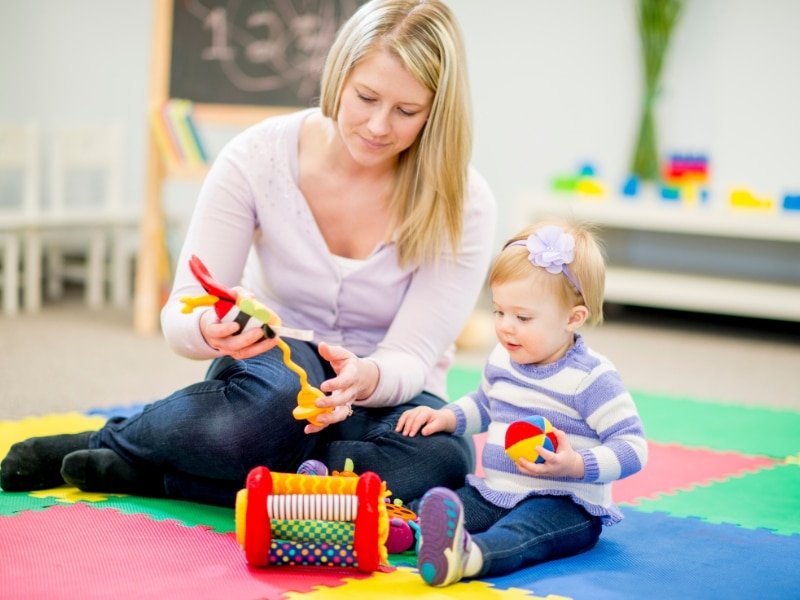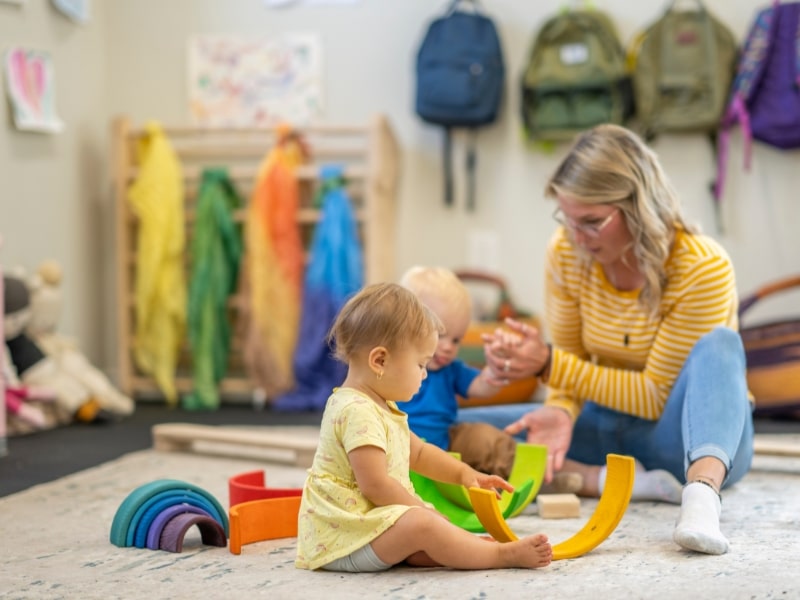Which Activities Do Daycare Programs Offer For Infants?

Choosing the right daycare for your infant is a significant decision for any parent. Daycare programs provide a safe and nurturing environment and offer various activities to support a child’s growth and development. This article will explore the diverse activities in daycare programs tailored explicitly for infants.
What types of play-based learning activities are available for infants?
Play-based learning is central to effective daycare programs. This approach enables infants to explore their surroundings while developing crucial skills. Here are some critical play-based learning activities:
- Interactive play: Building blocks and stacking cups encourage motor skills and spatial awareness. Consequently, these activities contribute to a child’s overall development.
- Creative arts: Simple crafts using safe materials allow infants to express themselves and enhance fine motor skills.
- Music and movement: Singing, dancing, and rhythm activities stimulate auditory skills and promote physical coordination.
- Imaginative play: Role-playing with toys helps infants understand the world and encourages social skills.
These daycare activities provide a foundation for infants’ cognitive, social, and emotional development.
How do outdoor play activities benefit infants?
Outdoor play is crucial for infant development. Daycare programs incorporate outdoor activities that provide numerous benefits for infants:
- Physical development: Climbing, crawling, and running on safe surfaces improve gross motor skills.
- Sensory exploration: Natural elements like grass, sand, and water engage infants’ senses, promoting curiosity.
- Social interaction: Outdoor settings encourage infants to interact with their peers, fostering early friendships.
- Connection to nature: Exposure to the outdoors helps infants build an appreciation for nature. Additionally, it encourages awareness of the environment around them.
How do daycare programs support language and communication skills?
Language development is a crucial aspect of infant growth. Daycare programs use a variety of strategies to enhance language and communication skills, including:
- Verbal interaction: Caregivers engage in conversations with infants, using descriptive language to enhance vocabulary.
- Read-aloud sessions: Regular reading sessions introduce infants to language patterns and sounds, fostering early literacy skills.
- Songs and rhymes: Singing nursery rhymes and songs improves phonetic awareness and rhythm in language.
- Encouraging gestures: Caregivers encourage non-verbal communication, like pointing or waving, to help infants express themselves.
These activities lay the groundwork for practical communication skills as children grow.
What sensory activities are offered to stimulate infant development?
Sensory play is essential for infants as it promotes cognitive and physical development. Here are some sensory activities that can be provided:
- Texture Exploration: Offering various materials, such as soft fabrics, rough surfaces, and smooth objects, helps infants develop tactile awareness.

- Sound Exploration: Musical instruments and sound-making toys engage the auditory senses, promoting listening skills.
- Smell Activities: Introducing safe scents like vanilla or citrus stimulates olfactory development.
Childcare solutions for busy parents offer convenience and a supportive environment where children can thrive and develop essential skills, including sensory experiences vital for healthy brain development and environmental awareness.
How do daycare programs foster socialisation among infants?
Socialisation is a crucial component of early childhood education. Daycare programs create opportunities for infants to interact and build relationships:
- Group activities: Participating in group games and activities encourages sharing and teamwork.
- Peer interaction: Opportunities to play alongside peers help infants learn social cues and develop empathy.
- Guided play: Caregivers facilitate playtime, teaching infants to take turns and resolve conflicts.
- Cultural exposure: Activities that celebrate diversity help infants understand and appreciate different cultures.
Fostering social skills in a supportive environment prepares infants for future interactions.
What safety measures are in place during activities for infants?
Infant safety is paramount in daycare settings. Several measures are implemented to ensure a secure environment during all activities:
- Supervision: Trained staff closely monitor infants during playtime to prevent accidents and provide immediate assistance.
- Safe equipment: All toys and play equipment are age-appropriate and regularly inspected for safety.
- Clean environment: The facility maintains high hygiene standards, ensuring a clean and safe environment for exploration.
- Emergency procedures: Staff are trained to respond quickly in first aid and emergency protocols.
Basically, these safety measures create a secure atmosphere where parents can feel confident about their child’s well-being. When evaluating your options, there are several important factors to consider when selecting childcare, including the facility’s safety standards, staff qualifications, and the curriculum offered.
How can parents stay informed about their child’s activities and progress?
Staying connected with your child’s daycare experience is essential for parents. Many daycare programs offer several ways to keep parents informed:
- Daily reports: Caregivers update activities, meals, and behaviour to keep parents informed.
- Parent-teacher meetings: Regular meetings allow parents to discuss their child’s development and concerns with caregivers.
- Communication apps: They share photos, videos, and important announcements to keep parents constantly updated.
- Open-door policy: Parents are encouraged to visit anytime to see their child’s environment and engage with staff.
Understanding your baby’s growth is crucial for parents as it helps them recognise developmental milestones and tailor their care and support accordingly. These communication strategies strengthen the partnership between parents and caregivers, enhancing the overall experience for children.
Why is it essential to choose a daycare with a comprehensive activity program?
Selecting the best daycare for infants with a well-rounded activity program is vital for your child’s growth and development. Here are a few reasons why:
- Holistic development: A diverse range of activities supports cognitive, physical, social, and emotional growth.
- Skill building: Engaging in various activities helps infants develop critical skills necessary for future learning.
- Positive experiences: A rich activity program fosters a love for learning and exploration, setting the tone for lifelong curiosity.
- Firm foundations: Comprehensive programs prepare infants for transitions to toddler and kindergarten levels, ensuring continuity in their education.

Generally, choosing a daycare that prioritises engaging activities is crucial in supporting your child’s early development.
Explore our infant programs at Innocent Minds!
If you’re looking for a daycare program that prioritises your infant’s development through engaging activities, Innocent Minds in Punchbowl and Yagoona is here for you. Our dedicated staff provides a safe, nurturing environment where infants can thrive through play-based learning, sensory experiences, and social interactions. Contact Innocent Minds today to learn more about our programs and how we can support your child’s growth!
